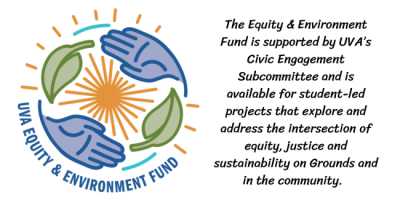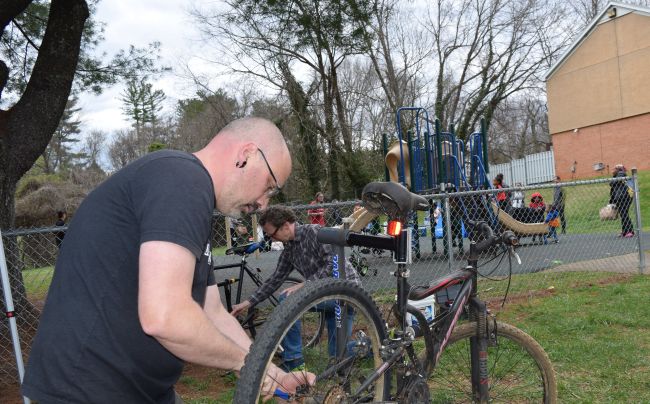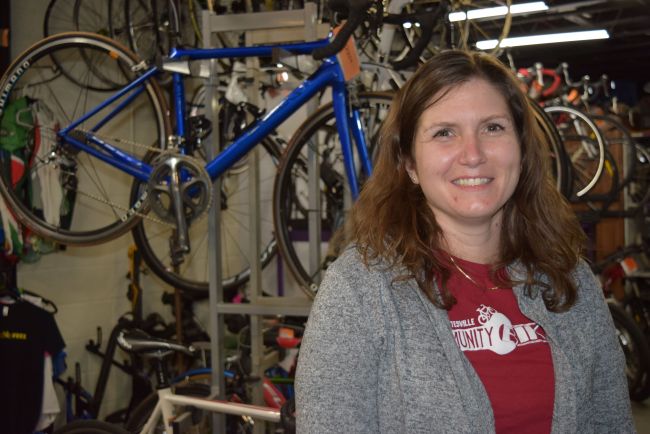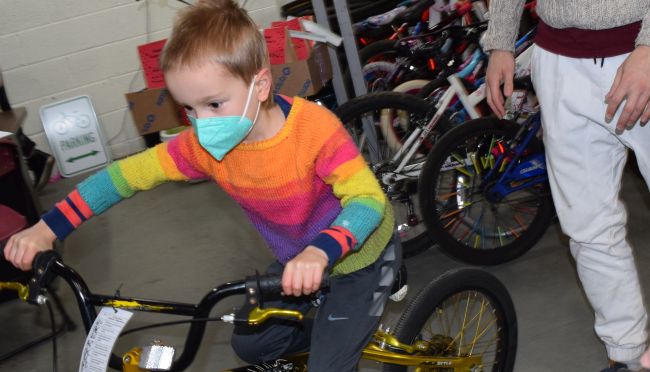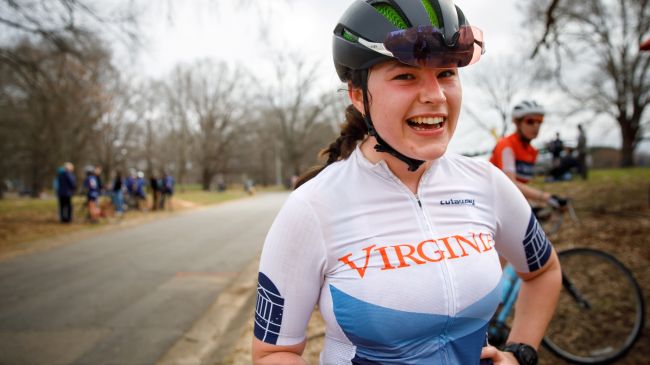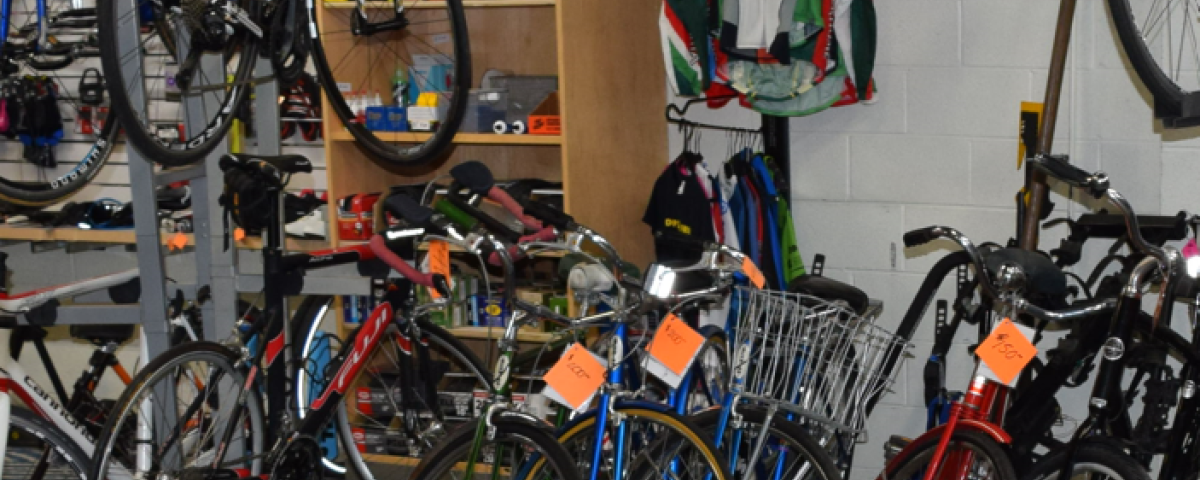
A nonprofit provides free bike repairs and safety programs in low-income neighborhoods - and a bridge to help connect diverse communities.
On a recent afternoon at a neighborhood fair, several kids watch closely as Jake Oswalt tinkers with a
bicycle clamped into a stand. He replaces the chain, tightens the brakes, changes a flat and takes it off the stand. Soon, one of the kids is pedaling up the street and popping wheelies.
One down - many more bikes to repair at this Mobile Clinic offered by Charlottesville Community Bikes (CCB).
Oswalt is the Operations Manager at the nonprofit organization, which promotes environmentally sound transportation, recycles bicycles and makes cycling accessible in Charlottesville.
The Mobile Clinic evolved last year, due in part to a grant from UVA's Equity & Environment Fund, which supports projects that explore the intersection of social equity and environmental sustainability.
The idea for the clinic is, rather than have people come into a bike shop for repairs, to go out into the community with the tools and skills to fix bikes on site, says Lauren Riegl, CCB's Executive Director.
"We're trying to reduce barriers that families and community members face when choosing bikes as a reliable form of transportation, and a lot of the time it's the costs of repairs and accessibility of repairs." For some people, she adds, there can also be a feeling of not belonging in the cycling scene, which has been dominated by white, usually well-to-do riders.
(Check out CCB's "Bikes & Parts" Drive this Friday, April 15.)
Bicycle demand explodes with Covid
Launched in 2001, the organization has been run almost entirely by volunteers.
The group takes donated bikes, fixes them up, selling some but mostly giving them away free to kids under 12, and to adults who are referred by a service organization such as Region 10.
"Then the pandemic happened and it all flipped on its head because we didn't have any volunteers," says Riegl. "It was crazy. There were lines out the door for bikes, and the free bike programs boomed because people didn't want to ride the bus." CCB gave away 200 adult bikes and 600 kids' bikes in 2020 alone. And last year, it gave a lot of bikes to the roughly 350 Afghan refugee families new to Charlottesville.
With so many bikes out there, Riegl says, they began to see that some people lacked the means to keep their bikes in good condition. The Mobile Clinics are geared for low-income communities, offering bike repairs but also to teaching maintenance skills and bike safety. The program also aims for broader transformation by being a catalyst for breaking down racial divisions within the cycling community and increasing equity and mobility across the community.
"Almost all the volunteers are cyclists, and connecting people in cycling with people in a community who they might not meet otherwise is one of the really awesome things about the clinics," says Kyle Rodland, the Safe Route to School Coordinator for Charlottesville. The city is a lead partner with CCB on the program, along with the Charlottesville Area Mountain Biking Club which provides the trailer for the clinics.
Last year, the Equity & Environment Fund, which paid for tires, tubes, chains and other parts for six Mobile Clinics, was instrumental in helping CCB get out into the community, Riegl says. "Without it we'd still be talking about doing something like this. It really propelled us into this outreach focus and using the bikes as a tool for change and not just helping people get a bike."
Bicycles as community bridges
CCB also hopes the clinics provide a bridge for connecting UVA and the community by involving students in the program.
UVA's Club Cycling has been a longtime partner with CCB. "They're a really important organization in Charlottesville and the club definitely wants to continue to support and promote them however we can," says Rachel Hightman, the club's outgoing vice president. Club members volunteered at the clinics, which align with the club's mission of spreading the message that bicycling is for everyone.
"Cycling is often seen as a wealthy white-man's sport, and a sport more than a mode of transportation," Hightman says. "The clinics can really help change that narrative." The club is co-sponsoring a community Bike Fest (Dairy Market, 10a.m.-4p.m.) and criterium race this Saturday as a fundraiser for the bike group.
Fourth-year student Lena Nguyen also helped out last year. A bicyclist herself with some maintenance knowledge, she changed a kid's flat and taught him how to do it, as well. "It's really cool to see what a different it makes for a nonprofit to go out in community and do this."
This March, CCB received a $10,000 grant from the Equity & Environment Fund. The money will support training for UVA and community volunteers, repair at least 125 bikes, and further the bike safety and maintenance education for low-income families.
UVA contributes in other ways, too, Riegl says. The Facilities Management department gives CCB bikes left behind by students and not claimed four months. And the Reusable Office Supply Exchange shop (ROSE) donated shelving, file cabinets, desks and other items when CCB moved to its new location on Preston Avenue.
"Biking is an environmentally friendly, healthy, and low-cost form of transportation that affords mobility to people with limited options," Riegl says. "We hope we are empowering residents to choose cycling as a means of sustainable transportation."
-- By Cat McCue, Communications Generalist, UVA Office for Sustainability

